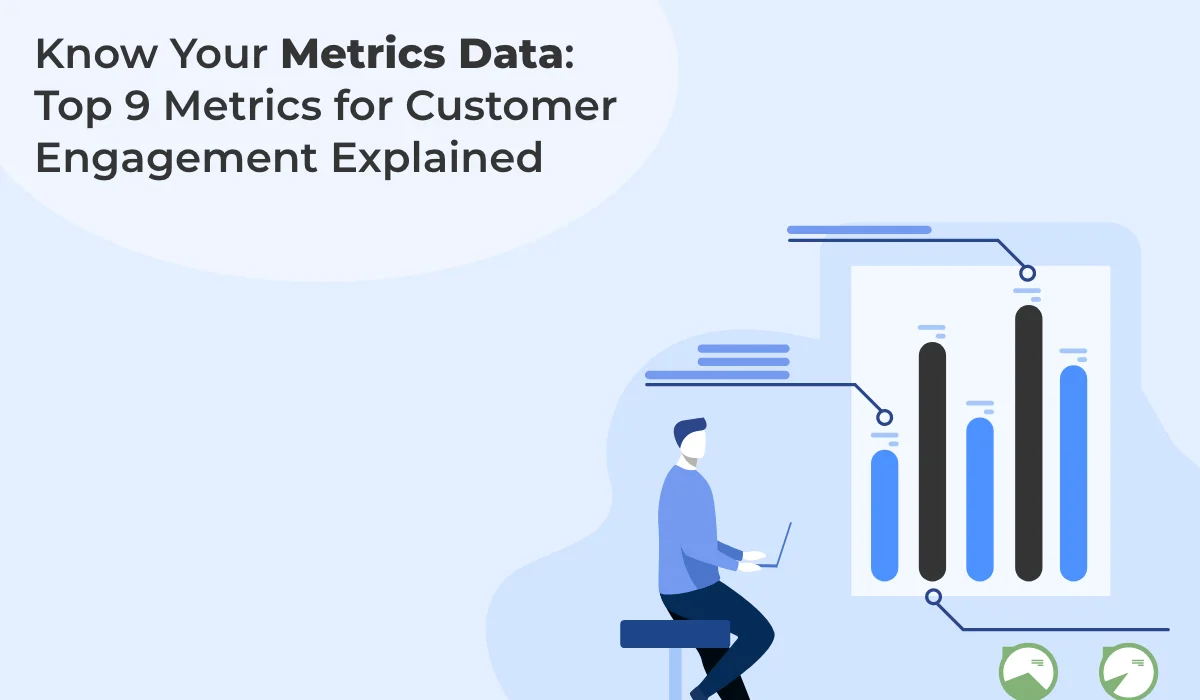Know Your Metrics Data: Top 9 Metrics for Customer Engagement Explained

Published on: May 4, 2023
Updated on: June 26, 2024
1823 Views
- Analytics
9 min read
A successful business needs multiple elements in the right place. It should be able to innovate new products, ensure customer satisfaction, build customer loyalty and most importantly, have the right tools to analyze metrics data.
Why is it important to track metrics data? Because without measuring user engagement, it is impossible to gain valuable insights needed to boost customer loyalty and improve engagement. Most of the successful businesses have excellent engagement and as a result, they get new customers through recommendations, which in turn improves the brand’s image.
There are multiple cases where customers are willing to forgive a brand’s mistakes, if they receive outstanding customer service. Therefore, customer engagement is crucial to building a lasting relationship with your customers.
Customer engagement data metrics analysis can help businesses formulate marketing strategies backed up by data. When done correctly, this practice can help you evaluate the exact lifetime value of your customers and devise strategies to enhance it.
For example, an ice cream seller keeps a track of his regular customers and also knows which flavor they prefer and how many times a week they visit his shop. Based on this information, he can refill his stock and recommend new products to the customers to increase sales.
In short, there are multiple data metrics that can be used to boost customer engagement and increase your revenue in the long run. In the following lines we will look into the different types of metrics data you can track to improve your business position in today’s highly competitive marketplace.
Understanding Customer Engagement Metrics:
Customer engagement metrics are essential in analyzing and evaluating customer behavior and interactions. By measuring these metrics, businesses can gain valuable insights into how their customers are engaging with their brand, products, and services.
There are various types of customer engagement metrics that provide specific indications of customer behavior. These metrics include:
- Click-through Rate (CTR): This metric measures the percentage of recipients who click on a specific link in an email, advertisement, or website. It helps determine how compelling the content or offer is to the target audience.
- Conversion Rate: This metric calculates the percentage of website visitors who complete a desired action, such as making a purchase or filling out a form. It provides insights into the effectiveness of marketing campaigns and website design.
- Time on Page: This metric measures the average amount of time visitors spend on a specific webpage. It indicates whether the content is engaging and if visitors find it relevant.
- Number of Pageviews: This metric counts the total number of times a webpage is viewed. It helps evaluate the popularity and reach of specific content.
- Social Media Engagement: This metric assesses the level of interaction, likes, shares, and comments on social media platforms. It indicates how effectively a brand engages its audience on social media.
Each of these metrics serves a unique purpose in understanding customer engagement. By analyzing and interpreting these metrics, businesses can make data-driven decisions to optimize their marketing strategies, improve customer experience, and drive business growth.
Importance of Customer Engagement Metrics
Understanding and tracking customer engagement metrics is crucial for the success, growth, and profitability of any business. These metrics provide valuable insights into the level of customer satisfaction, loyalty, and retention, which are essential factors in determining the overall health of a business.
By analyzing customer engagement metrics, businesses can identify areas of improvement and tailor their strategies to meet customer expectations. This, in turn, can lead to higher customer satisfaction levels, increased customer loyalty, and ultimately, improved business performance.
Moreover, customer engagement metrics can help businesses measure the effectiveness of their marketing efforts and campaigns. By monitoring key metrics such as click-through rates, conversion rates, and social media engagement, companies can assess the impact of their marketing initiatives and make data-driven decisions to optimize their strategies.
Customer engagement metrics also play a vital role in understanding customer behavior and preferences. By analyzing metrics like time spent on website, number of pages viewed, and repeat purchases, businesses can gain valuable insights into customer preferences and tailor their offerings accordingly.
In addition to these benefits, customer engagement metrics can also aid in identifying potential customer churn. By monitoring metrics relating to customer complaints, unsubscribe rates, and decrease in engagement levels, companies can proactively address issues and implement strategies to retain customers.
Tracking Customer Engagement Metrics:
1. Average Response Time:
Measuring the average response time is crucial in evaluating customer service efficiency. It provides insights into how quickly businesses are addressing customer queries and concerns.
To improve average response time and enhance customer engagement, businesses can adopt strategies such as streamlining communication channels, integrating AI-powered chatbots, and optimizing team workloads.
2. Customer Feedback Analysis:
Collecting and analyzing customer feedback is essential for understanding customer behavior and preferences. It helps businesses identify areas of improvement and make informed decisions to enhance customer engagement.
Techniques such as surveys, focus group discussions, and social media listening can be employed to collect customer feedback. Analysis of this feedback can drive product improvements, tailor marketing strategies, and foster stronger customer relationships.
3. Customer Effort Score (CES):
Customer Effort Score (CES) evaluates the ease of customer interactions and transactions. It measures the effort customers exert to resolve issues or complete tasks with a company.
To enhance customer engagement and satisfaction, businesses can improve CES by simplifying processes, providing self-service options, and offering proactive support. This reduces customer frustration, improves loyalty, and increases overall satisfaction.
Leveraging Customer Engagement Metrics:
1. Customer Segmentation:
- Importance of customer segmentation in tailoring marketing and engagement strategies
- Discussion of how customer engagement metrics can be used for effective customer segmentation
2. Social Media Engagement Metrics:
- Explanation of various metrics used to measure social media engagement
- Strategies to enhance social media engagement and strengthen brand presence
3. Email Marketing Metrics:
- Overview of email marketing metrics like open rates and click-through rates and their implications
- Techniques for optimizing email marketing campaigns using engagement metrics
4. Website and App Engagement Metrics:
- Explanation of website and app engagement metrics including bounce rate and conversion rate
- Tips for improving website and app engagement through data-driven insights
Benefits of Tracking and Analyzing Metrics Data
The last thing you want for your sales team is come across as bullish sales people. Today, one size fits all strategy doesn’t work and if you continue to follow this approach you will lose more customers and deteriorate your brand’s reputation.
So, how to ensure that your sales team is reaching out to the right people and not come out the other side as pushy or sleazy? By having the right metrics data to work with. Some of the most prominent customer engagement metrics include:
- Email open rate
- Survey responses
- Website traffic
These are just a few of the metrics that you can track to increase engagement, improve revenue and build customer trust.
Top Metrics You Must Track for Better Customer Engagement and Ensure Business Success
Metrics data can highlight your business’ strengths and weaknesses and identify areas of improvement for your business. With the right metrics data you can also develop effective sales and marketing strategies that improve qualitative and quantitative performance.
On that note, lets dive into the top metrics you can track for the betterment of your business. Let’s begin.
Net Promoter Score (NPS)
NPS determines how likely your customers will recommend your business to their friends and peers. It is often calculated through surveys where you ask your customers if they would recommend your business to other on a scale of 1 to 10.
Customer Lifetime Value (CLV)
This metric represents the revenue a customer generates with your business over their lifetime of engagement with the brand. It also helps you track how much they spend on products and in what amunt of time.
Customer Satisfaction Score (CSAT)
CSAT is a satisfaction metric and determined how well your products and services are. It is often determined through surveys or phone calls, and a higher CSAT score will bring more revenue in the future.
Visit Frequency
It shows how many times a customer returns to your brand. By analyzing this pattern you can get a clear picture of how a customer perceives your brand.
Churn Rate
This metrics tells you how many customers end engagement with your brand. A lower churn rate is better for a business, whereas a higher churn rate indicates that you need to work on your customer retention strategies.
Page Views
This metrics indicates the amount of traffic on different pages of your website. By analyzing page views you can ascertain your top offerings and make necessary improvements.
User Activity
This metric gives you a clear indication of the unique users that buy your products or services within a time frame. It is crucial to focus on this as it will help you understand why they are choosing certain products and services over others.
Social Media Engagement
By measuring the impact of your products and services across different social media platforms like Instagram, Twitter, LinkedIn and more, you gauge the influence your brand has on your target audience and devise strategies to improve engagement in the future.
Conversion Rate
This metrics determine the willingness of customers to make a purchase decision or complete an action on your platform. For example, if they want to place an order, or fill out a survey and more. Higher conversion rates are a sign of genuine customer interest in your brand.
By tracking metric data from the aforementioned metrics, you can gain a better understanding of your customers and develop strategies to improve customer satisfaction, retain customers and boost revenue.
Final Thoughts
Want to leverage metrics data to improve customer engagement and gain valuable insights about your business? Then it is time to work with a team of experts from Growth Natives. We offer innovative marketing solutions using our exclusive GrowthPod methodology to grow your business.
Our experts bring decades of collective experience to create the best customer engagement metrics dashboard, that showcases data in creative and easy-to-understand visualizations.
To learn more about our digital marketing services, email us at info@growthnatives.com or visit our website.



